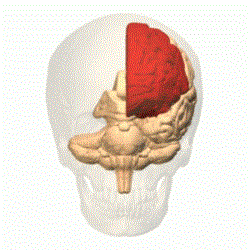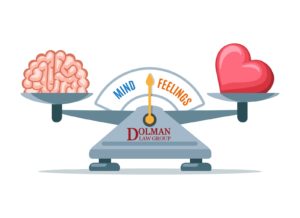When a traumatic brain injury results from another person’s negligence, you may file a claim or lawsuit seeking financial compensation for your personal injuries and damages.
If you or someone you love has sustained a brain injury in a serious accident, the Florida brain injury attorneys at Dolman Law Group can meet with you or your representative to discuss your case and may provide you with legal representation.
TBI cases are complex, and time may be of the essence in your case. Let the knowledgeable lawyers at Dolman Law Group assist you with your case today.
Florida Traumatic Brain Injury Lawyers You Can Trust Why Choose Us?
At Dolman Law Group, our Florida traumatic brain injury lawyers understand the lifelong complications you face after suffering a TBI. We know that these injuries are never simple. As such, you need to account for all of your future needs when seeking compensation.
Our Florida personal injury lawyers work with your medical team to determine the full scope of your injuries and how they will affect your life. This enables us to seek maximum compensation for our clients. We have offices across the state of Florida, from coast to coast. This means we can deliver big-time results for injured victims no matter where their accident occurs. While we may be a large law firm, we give all our injured clients the personalized one-on-one attention they need after an accident.
Our lawyers offer compassionate and aggressive legal guidance every step of the way. We are proud to assist injured TBI victims in Miami, Tampa, Boca Raton, Clearwater, New Port Richey, and across the state. To better assist you, we offer free initial consultations. During this consultation, we will discuss your case, your injuries, and your concerns.
Our Florida TBI injury lawyers will offer valuable and honest feedback so that you can choose the legal path that is best for you. To begin learning more about your legal options, call us at (727) 451-6900 or contact us online. We are here to help you through this difficult time.
Understanding Brain Injuries in Florida
Traumatic brain injuries—more commonly known as TBIs—often occur when an individual is involved in an accident. TBIs can range from mild to severe, and in most cases, the recovery time depends on the circumstances under which the injuries were sustained. In the mildest of cases, a patient’s recovery time could be as short as a few weeks. In more serious cases, however, the patient’s injuries and impairments could last a lifetime.
Perhaps most alarming about TBIs in the United States is the frequency with which they occur. Nearly 1.5 million people in the United States suffer from traumatic brain injuries of varying degrees on an annual basis. This essentially means that someone, somewhere in America, sustains a traumatic brain injury every 21 seconds.
When it comes to TBIs, keep in mind that no matter the circumstances, all TBIs—even the so-called “mild” ones—are still serious injuries. TBIs involve the brain and central nervous system and affect their ability to function. If you suspect that you have sustained a TBI, seek immediate medical treatment. Generally speaking, the longer a person delays seeking treatment, the greater the chances of developing serious cognitive impairments.
 Potential Causes of Brain Injuries After a Florida Accident
Potential Causes of Brain Injuries After a Florida Accident
TBIs typically occur when a strong external force is applied to a person’s head, causing the person’s brain to strike the front or back of the inside of the skull. In the process, the internal wiring of the person’s brain is often damaged, and this may lead to short or long-term cognitive impairments, such as memory losses and other symptoms. Any type of violent accident can cause a brain injury. However, the most common causes of Florida traumatic brain injuries include:
- Falls
- Slip and Falls
- Car accidents
- Motorcycle accidents
- Truck accidents
- Bicycle accidents
- Pedestrian accidents
- Assaults
- Boating accidents
- Drowning accidents
- Violence or gunshot wounds
- Military attacks or bomb blasts
Florida Brain Injury Symptoms
Most TBIs in Florida are mild or moderate. When on the milder side of the spectrum, these injuries usually resolve themselves in a few days’ time. Although these injuries are probably not life-threatening, they can still have significant impacts on a person’s central nervous system and its functioning. Common symptoms of mild or moderate TBIs include:
- Dizziness
- Amnesia
- Confusion
- Disorientation
- Lightheadedness
- Blurred vision
- Headaches
- Speech impairments
- Inability to focus or concentrate
Symptoms of more serious TBIs may include:
- Seizures
- Slurred speech
- Problems with memory
- Inability to taste or smell
- Extreme mood swings and fits of temper
- Permanent confusion or disorientation
- Loss of consciousness
- Permanent coma or vegetative state
TBIs can greatly range in their severity and the way they affect victims. The most serious TBIs often consist of a coma (in cases where the accident victim is unconscious and completely unresponsive), vegetative state (in cases where the accident victim goes back and forth between asleep and awake), and minimal consciousness (in cases where the accident victim is partially awake and may even respond to some limited visual or auditory stimuli).
Treatment for Traumatic Brain Injuries in Florida
Traumatic brain injuries are serious and typically require at least some medical treatment. The human brain is an extraordinarily complicated organ, and scientists have only recently begun to scratch the surface when it comes to understanding the brain’s complexities. Serious accidents can also affect each person’s brain differently. Conditions like brain swelling can vary from person to person, depending upon the accident victim’s age and pre-injury ability levels.
Due to the uniqueness of TBIs, recovery periods can vary significantly and may be difficult for health care providers to predict. Given these uncertainties, it is best to follow up at a hospital emergency room or urgent care facility immediately after sustaining a head injury in an accident.
Health care providers at the hospital will order the necessary medical examinations, tests, and imaging studies, such as X-rays and MRIs, that will determine what, if any, head injuries you sustained in your accident. Delaying treatment for a head injury can only make a bad situation worse and may potentially result in serious and permanent brain injuries and damage.
Proving Traumatic Brain Injuries After a Florida Accident
Proving a TBI requires the knowledge and expertise of a medical expert—typically, a health care provider—who can testify that you sustained a serious brain injury as a result of someone else’s negligence. If an expert can connect your TBI to the subject car, truck, boat, motorcycle, or slip-and-fall accident, you may recover monetary compensation in the form of damages.
Potential damages in a TBI case may include payment of all medical bills and compensation for lost wages, pain and suffering, economic harm, loss of ability to function, loss of earning capacity, emotional distress, and loss of spousal companionship.
Frequently Asked Questions About Florida Brain Injuries
Brain injuries are among the most complex and life-altering injuries that a person can receive. While a mild brain injury, often called a concussion, generally heals within days or weeks, more serious brain injuries can result in deficits to one or more functions and can even result in death.
If you or a loved one has suffered a brain injury as a result of someone else’s negligence, an experienced personal injury attorney can help you determine if you’re eligible to receive compensation. When someone suffers a brain injury, they or their family members often have a lot of questions. Here are answers to some of the most common questions people have following a brain injury:

A traumatic brain injury (TBI) is caused by a bump, jolt, or penetrating injury that disrupts the function of the brain. TBIs are common. According to information from BrainLine, around 2.8 million people suffer TBIs each year in the United States. Of those, 50,000 die due to the injury they sustained. Another 282,000 require hospitalization.
While TBIs are a contributing factor in about one-third of all injury-related deaths across the nation, about 90 percent of the individuals suffering a TBI are treated and released from hospital emergency departments. Direct medical costs and indirect costs of TBIs, such as lost productivity, carry a price tag for society of around $60 billion a year.
TBI symptoms vary according to the severity of the injury. As explained by the brain injuries are classified as mild, moderate, or severe. Mild brain injury symptoms include:
- Brief, if any, loss of consciousness;
- Vomiting or nausea;
- Dizziness;
- Memory loss;
- Fatigue;
- Blurred vision and other sensory problems, such as altered taste;
- Memory or concentration problems; and/or
- Changes to sleep or appetite.
Moderate brain injury symptoms are as follows:
- Convulsions or seizures;
- Dilation of one or both of the pupils of the eyes;
- Profound confusion;
- Unconsciousness for up to 24 hours;
- Signs of brain trauma that appear on neuroimaging tests;
- Weakness or numbness in the fingers or toes; and/or
- Contusions or bleeding.
Severe brain injuries present the same symptoms as moderate injuries, as well as the following symptoms:
- Unconsciousness for more than 24 hours, which is known as a coma; or
- Another abnormal state of consciousness, such as a vegetative state.
A child’s symptoms after a TBI may be similar to those of an adult. However, contrary to what was previously believed, children do not generally fare better than adults after suffering a brain injury. In fact, a brain injury in a child may be even more devastating as a child’s brain is still developing. Additionally, very young children cannot accurately describe what they’re feeling, which leads to brain injuries that may go undetected for a while or cognitive difficulties that aren’t apparent until the child is older.
BrainLine reports that the most common causes of traumatic brain injuries are:
- Falls, accounting for more than 47 percent of all TBIs (the risk of experiencing a TBI due to a fall is highest for children ages four years old and younger, as well as adults aged 75 years and older)
- Being struck by or against an object accounts for 15 percent of all TBIs. This, along with falls, are common workplace injuries in the construction industry.
- Motor vehicle accidents account for 14 percent of all TBIs. Car accidents are the leading cause of TBI-related death and are most commonly experienced among individuals aged 20-24 years old.
- Assault is the cause of around 9 percent of TBIs suffered in the United States.
15 percent of traumatic brain injuries are caused by reasons other than those listed above. This includes sports injuries, which most often affect teens.
There are five abnormal states of consciousness a person may experience following a brain injury:
- Stupor: A person is unresponsive but can be briefly aroused through a strong stimulus, such as pain.
- Coma: A person is completely unconscious, unaware, and unable to be aroused by stimuli for more than 24 hours. A person in a coma does not exhibit sleep and wake cycles.
- Vegetative state: A person is unconscious, unaware, and unresponsive to stimuli such as pain or light. However, they may have sleep and wake cycles and may often open their eyes, groan, or have reflexive responses.
- Persistent vegetative state: After a person has remained in a vegetative state for at least 30 days, they are considered to be in a persistent vegetative state. Adults have a 50 percent chance of recovering from a persistent vegetative state within the first six months, and children have a 60 percent chance. However, the longer they remain in a persistent vegetative state, the less likely a meaningful recovery becomes.
- Locked-in syndrome: This condition results in damage to portions of the lower part of the brain and the brain stem and causes an individual to be awake and aware but unable to move due to complete paralysis of the body. Most patients with locked-in syndrome communicate through blinking and eye movement, as the eyes are the one part of the body not impacted by paralysis.
The medications prescribed depend on the individual’s condition, but some commonly prescribed medications for brain injury patients include:
- Analgesics for pain management;
- Anti-anxiety medications to lessen feelings of nervousness or fear;
- Anticoagulants to prevent blood clots;
- Anticonvulsants to prevent seizures;
- Antidepressants to alleviate depression that is often experienced by those suffering from traumatic brain injuries;
- Antipsychotics to treat the combativeness and hostility present in the early months of an individual’s recovery;
- Muscle relaxants to relieve spasticity; and/or
- Stimulants to increase the patient’s ability to remain alert.
The pseudobulbar effect is a neurological condition that produces sudden, involuntary episodes of laughing or crying in many brain-injured individuals. These symptoms can be mild, causing embarrassment or frustration to loved ones or caretakers, or they can present as seizure-like episodes. Because crying is a common symptom, many people suffering from this condition are believed to be depressed.

The impacts of a brain injury on an individual are due to both the severity of the injury, as well as the area of the brain that has been injured. For example, someone with an injury to the temporal lobe might have difficulty with memory or communication, as that is the part of the brain that controls functions pertaining to recollection and receptive language. A person who has injured their cerebellum may have problems with balance, movement, and coordination due to that being the part of the brain that controls skilled motor activity and visual perception.
The brain has a very limited ability to generate new cells to heal. Most healing from brain injuries comes from the brain’s ability to bypass broken connections and rewire itself to complete the same tasks differently. The brain’s ability to establish new pathways to communicate with the body can be improved through extensive rehabilitation following the injury.
Several secondary complications can follow a brain injury, including:
- Swelling: After an injury, the body’s tissues often swell. Swelling in the brain is dangerous because space is limited within the skull, and the build-up of pressure may result in further damage to brain cells.
- Hydrocephalus: Water on the brain is generally experienced within the first year following the injury and may require the placement of a shunt to drain the fluid.
- Fever: A fever is not only a response to an infection but can also occur if the part of the brain that regulates body temperature is damaged.
- Pneumonia: The inability to move around often causes respiratory issues for individuals suffering from a brain injury.
- Blood clots: This is also often caused by a brain-injured person’s inability to move around, resulting in the slowing of blood flow to the affected part of the body.
- Infections: Infections in the brain are common when there has been a penetrating injury.
- Pressure sores: Also known as bedsores, this condition is common in bed-bound brain injury patients.
- Spasticity: This is the inability of the muscles in the body to relax following a brain injury.
- Urinary tract infections: These are often a result of improper bowel and bladder management in individuals with brain injuries who are incontinent as a result of their injury.
The lifetime costs of a patient’s treatment after a moderate to severe TBI generally ranges between $85,000 to $3 million. The average unemployment rate for adults two years after a TBI is 60 percent—many, many times more than the national unemployment average—often leaving brain-injured individuals and their families facing serious financial hardship. It is believed that more than 50 percent of homeless Americans are affected by a brain injury.
Brain injuries can completely change the personal relationships between the injured person and their family members, turning spouses and children into caretakers. Many brain injury patients suffer sexual dysfunction due to changes in their hormones related to the injury, an altered sense of self-confidence and body image, and changing interests. The family members of brain injury individuals often report feeling isolated and as though no one else understands what they’re going through.
If your accident is due to someone else’s negligence and your injury has resulted in significant or permanent loss of a bodily function, you may be eligible to file a personal injury lawsuit against the at-fault party to obtain compensation for medical expenses, lost wages due to the injury, loss of future earning capacity, and non-economic damages such as pain and suffering or loss of quality of life. An experienced personal injury lawyer can help you understand this process.
Generally, workplace injuries are covered by workers’ compensation insurance, which provides temporary and permanent disability benefits. A personal injury attorney can help you file a workers’ compensation claim.
Yes. Florida does not cap non-economic damages in personal injury lawsuits. It is important to discuss all of the impacts that your injury has had on your quality of life with your attorney, as this will help your attorney to establish value for your case. A case’s value is how much you plan to ask for in damages in a personal injury lawsuit, based on economic and non-economic costs that you’ve incurred due to your injury.
The foundation for a successful outcome to a personal injury claim is the ability to show that the at-fault party’s negligence caused the accident that resulted in your injury. Negligence is established by demonstrating that the other party failed to exercise a duty of care that a reasonable and prudent person would normally exercise in the same circumstances and that this failure resulted in the accident that caused your injury.
In addition to negligence, you also must provide a basis for the damages you’re seeking. You do this by providing receipts or other proof of expenses related to your medical care, as well as getting a medical professional to provide an opinion about your long-term prognosis.
Under Florida law, if you are going to file a civil lawsuit for a brain injury, your claim needs to be filed before the four-year statute of limitations expires. If your claim is not filed before the deadline, you will lose the opportunity to have your case heard in court.
However, if you are interested in filing a lawsuit for a fatal brain injury, the statute of limitations may be significantly shorter. Wrongful death lawsuits in Florida have a statute of limitations of just two years. If you have concerns that the statute of limitations could have an impact on the outcome of your case, speak with your attorney to discuss the details of your case.
If your child suffers a critical injury, they have the right to be compensated the same way an adult would. However, children must be represented by their parents or legal guardians. It will be up to you to work with a personal injury lawyer who can go over your child’s damages in detail. They can take into consideration the way their lives may be affected by their injuries in the future.
Brain injuries are known for having a lasting impact on victims’ lives. Your child’s entire future could be irrevocably changed by their brain injury and lead to lasting effect like autism. This must be considered when pursuing your brain injury claim.
Insurance companies have a reputation for being money-hungry. They will almost always put their own needs before those of brain injury victims or other victims of personal injuries. A strong legal advocate on your side can help you go up against the insurance company.
You do not want to risk having your statement twisted and manipulated, or be tricked into accepting an insultingly low offer. Instead, have your brain injury attorney step in and negotiate on your behalf. This way, you can show the insurance company you are taking your case seriously.
If you hope to maximize the amount of compensation you are awarded for your brain injury, be prepared to file both insurance and civil claims. When many injury victims find out they may need to bring their case to court to get the most out of their claim, they hesitate to move forward.
Obtaining a settlement through an insurance company that will adequately meet your needs may be more challenging than you thought. Insurance companies only cover certain types and amounts of economic losses.
When your damages exceed these limits, or the insurance company refuses to pay out on your claim, going to court and filing a lawsuit against the liable party could be your best chance to secure fair compensation for your brain injury.
Contact a Florida Brain Injury Attorney Today

The effects of traumatic brain injuries cannot be predicted easily, and symptoms can manifest themselves long after the date of your accident. Early detection and treatment at a hospital or urgent care facility may prevent permanent damage and can start you on the road to recovery.
If you or someone you love has sustained a TBI in a serious accident, the Florida injury attorneys at Dolman Law Group may represent you throughout your case.
Our attorneys will work hard on your behalf during settlement negotiations and, if necessary, will aggressively litigate your case in the Florida court system. To schedule a free initial consultation or case evaluation with a Florida brain injury attorney, please call us today or contact us online.
All Areas We Serve in Florida
- Aventura Brain Injuries
- Bradenton Brain Injuries
- Clearwater Brain Injuries
- Doral Brain Injuries
- Fort Lauderdale Brain Injuries
- Jacksonville Brain Injuries
- Largo Brain Injuries
- New Port Richey Brain Injuries
- North Miami Beach Brain Injuries
- Orlando Brain Injuries
- St. Petersburg Brain Injuries
- Tallahassee Brain Injuries
- Tampa Brain Injuries
